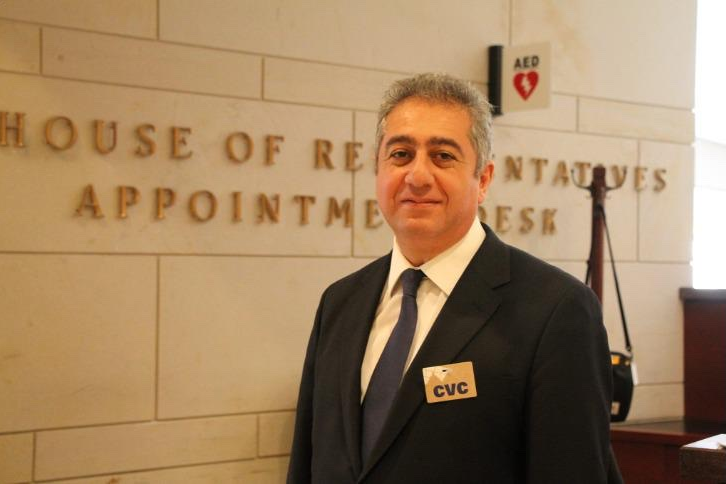For years, Gubad Ibadoghlu has advocated for democratic principles and socio-economic progress within Azerbaijan. He had been a leading figure in the Economic Research Center, a non-governmental organisation conducting research on public finance management, good governance, and budget transparency until the government forcibly closed it in 2014. His dedication to advancing academic excellence has led to teaching positions in academic institutions in the United States and Europe, and to a position as a senior visiting scholar at the London School of Economics until recently. Gubad Ibadoghlu is also the chairperson of the Azerbaijan Democracy and Prosperity Movement.
According to Ibadoghlu’s family, on Monday, 23 July, twenty Azerbaijani police in plain clothes arrested him and his wife, Irada Bayramova, while they were in their car after civilian cars rammed the vehicle Ibadoghlu was driving and forced a traffic accident. Both Ibadoghlu and Bayramova were physically assaulted by police during the arrest, and disturbing videos have emerged showing Bayramova with bruises on her body. Both detainees were taken to the Interior Ministry’s Organised Crime Department for interrogation, an institution that has a record of ill-treatment of detainees.
Ibadoghlu’s family have said that during the first five hours of detention, Ibadoglu and Bayramova were not informed of the reasons for their arrest, were not allowed to contact their lawyers, and were kept in separate cells. Eventually, Bayramova was released. On 24 July, the Narimanov District Court sent Ibadoghlu for three months and 26 days of pre-trial detention on charges related to the “preparation, acquisition, or sale of forged securities to an organised group.” Such charges carry a maximum penalty of 8 to 12 years in prison.
We urgently call upon the Azerbaijani authorities to conduct an independent and impartial investigation into the circumstances surrounding the arrests of Gubad Ibadoglu and Irada Bayramova. We demand Gubad Ibadoglu’s immediate release as we are convinced that the charges against him are false and have been brought for politically motivated reasons.
Furthermore, we express deep concern about the harsh conditions of detention endured by Gubad Ibadoghlu. His family has reported that he suffers from type 2 diabetes, heart disease, and poor eyesight, and since his arrest that he has faced difficulties in accessing necessary medications to treat his condition, proper food, clean drinking water, and his glasses. His cell lacks air circulation, natural light, and proper sanitary conditions.
It should be noted that the use of excessive force, ill-treatment, denial of medical aid, and poor detention conditions constitute inhumane and degrading treatment, which is strictly prohibited under both Azerbaijani legislation and international human rights treaties to which Azerbaijan is a party. These include, but are not limited to, the United Nations Convention against Torture and Other Cruel, Inhuman, or Degrading Treatment or Punishment (UNCAT), the European Convention on Human Rights (ECHR), and the International Covenant on Civil and Political Rights (ICCPR). As a state party to these treaties, Azerbaijan is obligated to uphold and protect the inherent dignity and rights of all individuals, including detainees, ensuring that they are treated with respect and provided with adequate medical care, humane detention conditions, and protection from any form of abuse or mistreatment. Any violations of these obligations must be thoroughly investigated and remedied to uphold the principles of human rights and the rule of law.
We also highlight the obstacles faced by Gubad Ibadoglu in accessing his lawyer. According to information provided by family members, until 27 July, Gubad Ibadoghlu was unable to meet with his lawyer in private. On the 26th of July, lawyers were kept in the waiting room of the detention centre for over two hours. The following day, the lawyer could only meet with Gubad Ibadoghlu after obtaining permission from the investigator, who accompanied the lawyer during the meeting. Additionally, during the meeting, Ibadoglu was compelled to remain handcuffed and was denied access to his glasses. By monitoring, observing, and listening to Ibadoghlu’s meetings with his lawyer, the authorities impeded open communication and hindered his ability to document the possible physical and psychological abuse he may have suffered while in detention.
Access to the lawyer of one’s own choosing and the preservation of lawyer-client privilege, ensuring confidentiality, are fundamental components of the right to a fair trial, as guaranteed by the European Convention on Human Rights, the International Covenant on Civil and Political Rights, and various other human rights treaties to which Azerbaijan is a signatory. These rights are essential safeguards that ensure detainees can effectively defend themselves against any charges and have open and confidential communication with legal counsel to uphold their rights and dignity during the legal process. Any limitations or hindrances to these rights raise serious concerns regarding the adherence to international human rights standards and must be thoroughly addressed by the Azerbaijani authorities.
As a visiting researcher in economics at the London School of Economics and a civil activist, Ibadoglu carried out work and made contributions to public discourse that should be protected, and any charges against him should not be politically motivated. The Azerbaijani authorities must respect and protect the right to freedom of expression, allowing him to freely express his opinions and criticisms without fear of persecution or harassment.
We stand in solidarity with Gubad Ibadoghlu, Irada Bayramova, and their family during this challenging time, and we will continue to exert every effort to seek justice and safeguard human rights.
Signatories:
- Human Rights Watch
- Human Rights House Foundation
- World Organisation Against Torture (OMCT)





